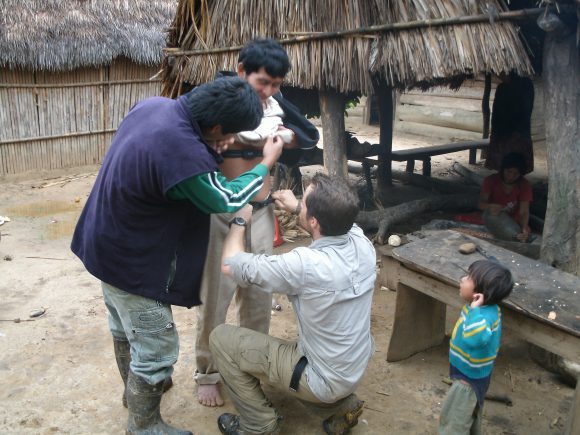
Chapman receives largest federal grant in school history
November 15, 2017
The National Institutes of Health/National Institute on Aging recently awarded a five-year $3.7 million grant to Hillard Kaplan, Ph.D., to pursue his research on Alzheimer’s disease. As part of a larger research project called The Tsimane Health and Life History Project, Dr. Kaplan has been studying a tribe in Bolivia that are of interest to the scientific community for several reasons.
The tribe a relatively isolated existence, they speak their own language, only reproduce within the tribe, and live an active lifestyle due to the lack of modern conveniences. Of particular note, the Tsimane people have a low-prevalence of diabetes, hypertension and artery disease, yet have high levels of infection and inflammation. Dr. Kaplan’s particular interest is in brain aging, with emphasis on dementia and Alzheimer’s. Dr. Kaplan is a member of Chapman University’s Economic Science Institute.

Human Biologist Dr. Ben Trumble demonstrating how to attach an accelerometer
“Little is known about the incidence, prevalence, and predictors of Alzheimer’s disease in populations living traditional pre-industrial lifestyles similar to those experienced over human pre-history,” said Dr. Kaplan. “This information is critical to determine whether Alzheimer’s disease is a byproduct of modern environments.”
The hearts and arteries of Tsimane males and females age two to three decades slower than those in the United States. Because of their high levels of activity and low levels of saturated fat in their diet, they have little plaque in their coronary arteries. Arterial health is one factor affecting the risk of Alzheimer’s and this will be the first study on Alzheimer’s on a population with excellent vascular health.
This study has three goals: 1) to conduct long-term assessment of cognitive impairment and dementia with measurement of physical activity between assessments; 2) to conduct neuroimaging of the brain related to cognitive impairment, Alzheimer’s disease and other dementias; and 3) to investigate the epidemiology of brain atrophy, cognitive impairment, Alzheimer’s disease and other dementias.
“The research is time sensitive, as Tsimane are modernizing at an accelerating rate,” says Dr. Kaplan.
The official name of the grant project is “Brain atrophy, cognitive impairment and Alzheimer’s in a low CVD-risk population.” The research will use state-of-the-art bio imaging technology with a representative sample of 1,310 Tsimane adults ages 40 and older. This project will leverage 14 years of Tsimane research.
“This grant exemplifies the continued growth in science and research at Chapman in exciting new interdisciplinary areas that are supported by funding agencies like the National Institute of Aging (NIA),” said Tom Piechota, Ph.D., vice president of research at Chapman University.